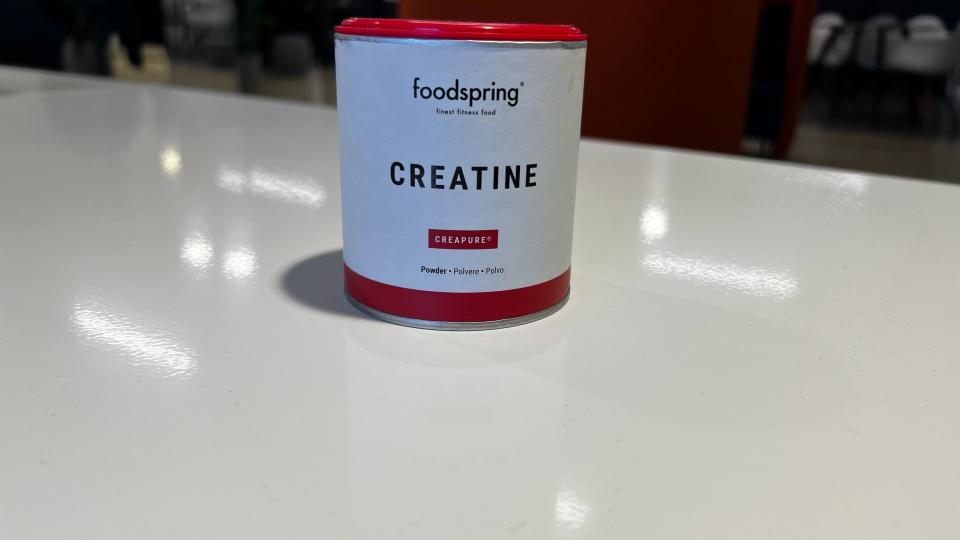I took creatine every day for 12 days like Mark Wahlberg — here’s what happened to my body

When I drank apple cider vinegar every day like Victoria Beckham in a recent challenge, I had to do some digging to discover the perceived health benefits.
Creatine, on the other hand, I’m way more familiar with. In my line of work as a personal trainer, you’re never too far away from a supplement, protein shake, or pre-workout. Despite dabbling with it here and there, though, I’ve always preferred a strong coffee to rev me up before a workout.
But having co-founded PI Nutrition, Mark Wahlberg appears to be a fan, along with many others. So, I picked up one of the best protein shakers and took creatine every day for 10 days before workouts to see what might happen to my body.
If you’re unfamiliar with creatine and its benefits, I cover them below, plus contraindications and what I experienced when taking it. Here’s what I learned.
How creatine works
Your body produces the compound creatine from amino acids. It’s made in the liver, kidney and pancreas and over 95% stores in the muscle cells as phosphocreatine (a small amount also stores in the brain), contributing toward energy production. If we think of it as an energy provider, creatine is useful when you have high energy and power output demands like during HIIT, sprinting and powerlifting, for example.
That’s why athletes, bodybuilders and gym-goers take creatine to boost athletic performance and increase muscle mass. Taken orally and in powder form with water (no, you absolutely shouldn’t be dry scooping), creatine can supply energy to your muscles and top up depleted supplies, otherwise found in your food and naturally occurring in the body.
Creatine benefits
Here’s where I rely on some existing research to fill the gaps in my knowledge.
We know that creatine could increase energy to the muscle by increasing phosphocreatine stores, helping you power out more reps and ramp up overall exercise volume. According to sources like the Mayo Clinic, this could lead to "greater gains in strength, muscle mass and performance" and also help exercisers "that require a rapid recovery during training and competition."
It’s the most common (and popular) supplement I see amongst the fitness community, and existing studies back up that it can do just that. There’s also limited research that suggests it can lower blood sugar and improve brain function. By increasing your phosphocreatine stores, energy stores also increase, helping you replenish ATP (your body’s energy currency for producing muscle contractions) quicker, maintaining optimal performance for longer.
I took creatine every day for 10 days — here’s what happened to my body

Before jumping in, we don’t encourage supplementation fads at Tom’s Guide, and I work based on my experience as a personal trainer and with existing research. What works for my body might not for you, so exercise caution if you try supplementation.
I noticed the difference
If you’re looking for a quick energy source to power muscles, creatine does the job. As with the other times I’ve had it (usually leading up to a CrossFit Open or team workout), I experienced the familiar uplift that creatine provides during the slog of heavy weightlifting or high-powered workouts to keep me going.
Creatine is often found in pre-workouts alongside other ingredients like caffeine, but it's not the same thing, so while the buzzy feeling you get when taking pre-workout usually comes from a potent dose of caffeine, creatine takes care of helping to improve performance, alertness and output. And because the benefits can kick in quickly, it’s an easy and effective way to supercharge the mind and body. That said, you don't notice it exactly like you do a pre-workout.
I got less nauseous than with pre-workout
This has always been the problem with pre-workouts, creatine and me — I get nauseous. Several reasons can cause it: consuming too much caffeine, not eating or drinking enough water beforehand, or taking too much. You could also be allergic to some of the ingredients, which, thankfully, I’m not. I just have a very sensitive stomach.
If you're wondering, is creatine different from pre-workout? Yes! Creatine is a single ingredient designed to be taken daily and over time to improve performance and recovery. Pre-workout uses several ingredients (including a high caffeine content) to boost short-term energy and focus and get you feeling pumped before a workout.
I recommend finding a brand you like (I chose Food Spring creatine) with raw 100% creatine monohydrate for purity and maximum bioavailability, and be wary of nasty additives hidden inside. Food Spring recommends 5g of powder (one measuring spoon) with 200ml of water immediately before workouts. The brand also recommends 2.5-3.5 liters of water per day when consuming it daily, and just 3g per day could be sufficient for seeing benefits.
I'm going to explore it for longer
Granted, I prefer fueling my workouts with a strong cup of coffee and protein, (protein taken before workouts can help increase muscle protein synthesis), but I feel inclined to explore this for longer, given that creatine is something to be measured for performance over time. It creates quick-burst energy and increases strength without losing the ability to perform longer workouts, but despite experiencing an uplift during and after workouts, I will always push a healthy diet rich in natural energy boosters alongside regular workouts before anything else.
I haven't noticed muscle gains (yet)
More interesting to me than energy were the studies (like this by the Journal of the International Society of Sports Nutrition) on gains in lean muscle mass and power, which can occur from regularly taking creatine alongside lifting weights. Of course, I didn’t see rapid changes after just 10 days, but I’d be interested to see what months of taking creatine could do to my body.
The process of building muscle — called hypertrophy — takes months rather than days and depends on factors such as a consistent and structured routine, ample protein intake (roughly 0.7–1 gram per pound of body weight daily) and progressive overload (gradually increasing workout volume as you get stronger and fitter). We’ve provided the lowdown on hypertrophy vs strength training if you want to learn how to taper weightlifting to your goals.
A popular approach is creatine cycling, whereby you’d take four or five 5g servings throughout the day for a week, then lower the dose for maintenance, taking breaks after several weeks. But you don’t have to “load” to see benefits to boost creatine stores and enhance muscular performance — 3-5g before a workout can do the trick.

It didn't wreck my sleep
A good sleep routine is make-or-break for my working week, so if I'm awake past 10 p.m. or mid-week social plans mean losing out on slumber, my boyfriend hears about it for a month. (Yep, I’m only 33).
There aren’t any contraindications to taking creatine at night, but if you’re seeking the best time to exercise, a general rule of thumb is to avoid high-intensity workouts and heavy weightlifting sessions close to bedtime and after 7 p.m. if you want a good night’s sleep.
That said, varying reports suggest creatine can take 1-4 hours to wear off completely. Taking creatine shortly before (and after) exercise is your best bet. And I recommend consuming it with food if you experience sensitivity, especially on rest days — here’s the best time to take pre-workout, according to a sports nutritionist if you're looking to take a pre-workout with creatine in it.
I took creatine every day for 10 days — here’s my verdict
I enjoyed this challenge and am glad I gave creatine a go. But whether or not I enjoy it in the long term is yet to be seen. And 10 days hasn't changed my mind yet. Although this has been a short experiment so far, given creatine’s ability to yield quick and accessible energy to muscles, I still experienced some benefits during workouts toward days five to 10 — notably, feeling fueled and energized with less fatigue.
You're unlikely to feel massive changes, to begin with, as you'll need to build creatine levels. Optimally, take 30 to 60 minutes before workouts, and expect a difference in around five to seven days, give or take.
When we digest protein, our body naturally produces and stores creatine, which is good enough for me. I recommend always looking at your diet before adding a creatine supplement. And remember to take breaks of one to two weeks between periods of creatine cycling if you use it long-term.
I teach clients to focus most of their attention on eating a good diet, managing workouts and maintaining a slight calorie surplus if the goal is to build muscle. After all, supplements can be expensive.
A good sleep routine is make-or-break for my working week, so if I'm awake past 10 pm, or mid-week social plans mean losing out on some slumber, my boyfriend hears about it for a month.
Current scientific evidence doesn’t indicate creatine is unsafe when sticking to recommended doses and following the manufacturing guidelines of the product. From what I can find, those with kidney problems should seek medical advice before taking creatine, and combining caffeine with creatine could worsen sleep and cause some stomach discomfort if you consume over the recommended daily dosage.
